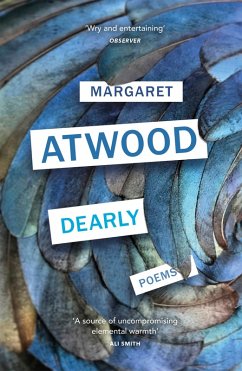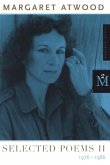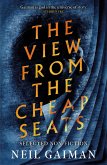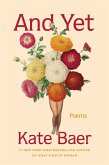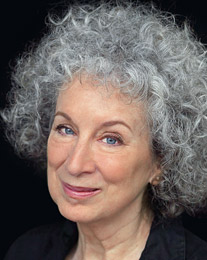By turns moving, playful and wise, the poems gathered in Dearly are about absences and endings, ageing and retrospection, but also about gifts and renewals. They explore bodies and minds in flux, as well as the everyday objects and rituals that embed us in the present. Werewolves, sirens and dreams make their appearance, as do various forms of animal life and fragments of our damaged environment.
Dearly is a pure Atwood delight, and long-term readers and new fans alike will treasure its insight, empathy and humour.
BOOK OF THE YEAR OBSERVER, FINANCIAL TIMES
Dieser Download kann aus rechtlichen Gründen nur mit Rechnungsadresse in A, B, BG, CY, CZ, D, DK, EW, E, FIN, F, GR, HR, H, IRL, I, LT, L, LR, M, NL, PL, P, R, S, SLO, SK ausgeliefert werden.
"Margaret Atwood deserves an adjective - Atwoodian - in recognition of her virtuoso wit and unmistakeable style."
- Chicago Tribune
"Atwood's new book-her first collection of poems in over a decade-is a good reminder of her mastery of the craft. In Dearly, Atwood's inspirations run the gamut from the intoxicating pleasures of nature to the fantastical goings-on of zombies, but the themes are grounded in the familiar: love, loss, desire and the inevitability of time passing. Atwood blurs the lines of what we know and asks us instead to give credence to what we feel." - Time
"It is sometimes debated whether every great novelist must first be a great poet. If you look at the likes of poets-turned-novelists like Jesse Ball or Denis Johnson, you might be inclined to agree. Don't forget Margaret Atwood, who began publishing poetry in the early-1960s, self-publishing her first collection, Double Persephone, in 1961. Her latest poems collected in Dearly include melancholy meditations on life and death and the gender of werewolves." - Wall Street Journal
"For the first time in more than a decade, Atwood - an accomplished poet, though best known for "The Handmaid's Tale," among other novels - is releasing a wide-ranging new collection of poetry. It's hauntingly beautiful, with reflections on life and death, time and change, and nature and zombies. The strong imagery and atmosphere will probably hook even those who had only been familiar with Atwood's fiction." - Washington Post
"Atwood's flare for precise metaphor in no way softens her delivery. . . . Combining the wit of Dorothy Parker with the wisdom of Emily Dickinson, Atwood adds a steely grace and richness of her own. If there is beauty in despair, one may find it here." - Library Journal (starred review)
"Atwood's first books were poetry collections; decades later, she infuses her newest poems with the flinty wit and surefire lucidity readers cherish in her best-selling, influential fiction, including The Testaments. Spiked with surprising juxtapositions and wily delight in language, at times mordant, frequently hilarious, and always unflinching." - Booklist
"The soaring quality of the verse itself . . . [is] always illuminated by characteristic flashes of brilliance and wit, and powered by a pure force of creative energy. . . . Atwood's poetry is vibrant with purpose, brilliant, hard-edged, and instantly legible; and they will doubtless become classics of our troubled time." - The Scotsman
"Atwood... returns with a sardonic and sagacious masterpiece to add to her significant oeuvre...Atwood has a knack for creating piquant emotional textures, infusing ideas, experiences, and objects with palpable life...Combining dignified vulnerability, lyrical whimsy, and staunch realism, Atwood offers a memorable collection that emboldens readers to welcome disillusionment." - Publishers Weekly (starred review)
"Here we see Atwood at the height of her poetic powers...The more Atwood wields specifics, the more of the world she skewers with her fantastically sharp imagination." - New York Times Book Review

